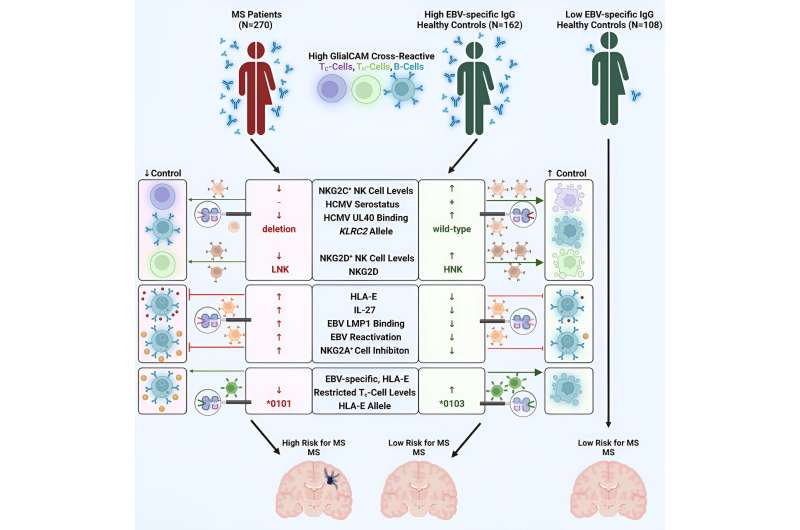This article has been reviewed according to Science X's editorial process and policies. Editors have highlighted the following attributes while ensuring the content's credibility:
fact-checked
peer-reviewed publication
trusted source
proofread
New study suggests possible targets for multiple sclerosis vaccine development

Multiple sclerosis (MS) is a chronic inflammatory autoimmune disease in which the Epstein-Barr virus (EBV) is thought to play a role that has not yet been fully clarified. In particular, it was previously unclear why almost all people are infected with EBV in the course of their lives, but the virus only triggers MS in a small number of people.
A team of scientists from the Center for Virology and the Department of Neurology at the Medical University of Vienna has now succeeded in identifying several mechanisms that protect people from an EBV-induced autoimmune reaction and thus potentially from MS. The study, recently published in the journal Cell, suggests possible targets for the development of a vaccine to protect against MS.
The underlying cause of MS has not yet been fully clarified, but a connection with the Epstein-Barr virus (EBV) has long been suspected. In most patients who develop MS, specific immune responses against EBV are detectable, which are also directed against certain structures of the central nervous system and thus contribute to the development of MS. Until now, however, it was unclear why an EBV infection, one of the most common and lifelong persistent viral infections in humans, only leads to MS in a small number of people.
A research group at the Center for Virology led by Elisabeth Puchhammer-Stöckl, in cooperation with a team from the Department of Neurology at the Medical University of Vienna led by Thomas Berger and Paulus Rommer, has now shown that the risk of MS is particularly high in people with a combination of certain host factors and virus variants.
Natural killer cells as a potential protective factor
To be specific, the investigations revealed a greatly increased risk of MS, if, on the one hand, the EBV-specific and autoreactive immune responses are strong and, on the other hand, the patients are unable to control this autoimmunity efficiently. The study authors identified a subgroup of the natural killer cells of the human immune system as a potential key factor for protection against MS.
"These immune responses could therefore play a decisive role in the development of future vaccines," says Hannes Vietzen from the Center for Virology, first author of the study, describing the new possibilities that arise from the research work with regard to the prevention and early detection of MS.
According to the investigations, the development of MS proved to be dependent on certain genetic factors as well as on infection with a specific EBV virus variant, which, according to the laboratory experiments, leads to a significantly weakened immune response against the autoreactive processes and thus contributes to the development of MS.
"It may be helpful to analyze the EBV variants detected in these patients in order to identify patients at risk at an early stage," says Hannes Vietzen in the run-up to further studies that are intended to deepen these findings.
More information: Hannes Vietzen et al, Ineffective control of Epstein-Barr-virus-induced autoimmunity increases the risk for multiple sclerosis, Cell (2023). DOI: 10.1016/j.cell.2023.11.015



















